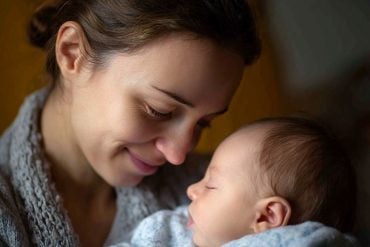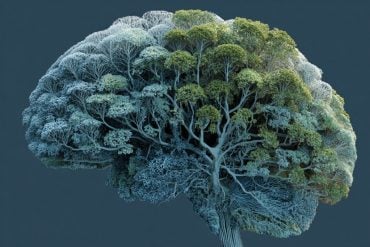Summary: People are more likely to change their beliefs about others when hearing good news, but hardly change their beliefs following bad news, a new study reports.
Source: University of Oxford.
Humans can be ‘vicariously optimistic’ for those we care about, enabling us to view our own lives – and those of our friends and family – through ‘rose-tinted glasses’.
The research, which is the first to show that such an ‘optimism bias’ extends beyond the self, found that people readily changed their beliefs about a person they like when receiving good news but barely changed their opinions about them after receiving bad news. This ‘vicarious optimism’ in their learning about others was found to be stronger the more people cared about another person, and was even seen for strangers. The study was conducted by researchers from City, University of London, Oxford University and Yale University.
To examine how far this optimism bias extended, the researchers studied a mechanism known as ‘good news/bad news effect’ that generates and protects our optimism.
In life we sometimes change our beliefs about ourselves based on new information we receive. For example, when told we are more intelligent than we thought – good news – we update our beliefs, but if we hear we are less intelligent than we suspected – bad news – we change little. This learning bias appears to arise from the desire to feel good about ourselves and our future.
But we also want to feel good about the future of people we care about. Bad news for people we care about feels dreadful, potentially preventing us from integrating such information into our beliefs about these people. This ‘good news/bad news effect’ can also tell us how much someone cares about another person, as the more we care about another person, the more likely we are to accept good news about that person and reject bad news.
To test if such an optimism bias extends beyond the self, the researchers recruited more than 1,100 participants for five studies. In each of these studies, participants imagined a host of negative life events happening to other people, ranging from their friends to strangers. The research is published in the journal Psychological Science.
For a friend, for instance, participants imagined a negative life event (losing one’s luggage, getting cancer, missing an important meeting…) happening to them. They were then asked to indicate the likelihood of such an event occurring. Following this they were told the actual probability of such an event taking place.
Sometimes, this information was good news – it was lower than participants expected. And other times, this information was bad news – it was higher than they expected. To measure how much people used good and bad news to change their belief about the other person, participants were then given a second chance to indicate the likelihood of the event occurring to their friend having previously been told the actual probability. The differences between their estimate before and after receiving the news is taken as an index of belief change.
The researchers found that the optimism bias indeed extends beyond the self, and that this effect was stronger the more people cared about another person. If participants, for instance, first read information about a stranger indicating that this person was a good person, they showed subsequently vicarious optimism for that person. However, if they read that a stranger was not a nice person, the vicarious optimism decreased substantially for that person. Finally, the more pronounced the vicarious optimism for a stranger, the more likely participants were to help people similar to that stranger.

Dr Andreas Kappes, who led the study while at Oxford University and is currently a lecturer in the Department of Psychology at City, University of London, said: ‘Our research shows that we see not only our own lives through rose-tinted glasses, but also the lives of those we care about. What we found is that participants showed vicarious optimism when learning about the outcomes affecting others they care about, updating their beliefs less in response to bad news compared to good news. But this optimism did not stop with friends – it also extended to strangers when learning about their future.’
Dr Molly Crockett, senior author of the study and Assistant Professor of Psychology at Yale University, said: ‘These studies suggest that empathy affects how we learn as well as how we make decisions. Those people with stronger ’vicarious optimism’ for strangers were more likely to help a stranger in need. Concern for others leaves its fingerprints on the beliefs we develop about the world.’
Source: University of Oxford
Publisher: Organized by NeuroscienceNews.com.
Image Source: NeuroscienceNews.com image is adapted from the University of Oxford news release..
Original Research: Abstract in Psychological Science.
doi:10.1177/0956797617737129
[cbtabs][cbtab title=”MLA”]University of Oxford “Viewing Ourselves, and Others, Through Rose Tinted Glasses.” NeuroscienceNews. NeuroscienceNews, 5 February 2018.
<https://neurosciencenews.com/vicarious-optimism-psychology-8430/>.[/cbtab][cbtab title=”APA”]University of Oxford (2018, February 5). Viewing Ourselves, and Others, Through Rose Tinted Glasses. NeuroscienceNews. Retrieved February 5, 2018 from https://neurosciencenews.com/vicarious-optimism-psychology-8430/[/cbtab][cbtab title=”Chicago”]University of Oxford “Viewing Ourselves, and Others, Through Rose Tinted Glasses.” https://neurosciencenews.com/vicarious-optimism-psychology-8430/ (accessed February 5, 2018).[/cbtab][/cbtabs]
Abstract
Concern for Others Leads to Vicarious Optimism
An optimistic learning bias leads people to update their beliefs in response to better-than-expected good news but neglect worse-than-expected bad news. Because evidence suggests that this bias arises from self-concern, we hypothesized that a similar bias may affect beliefs about other people’s futures, to the extent that people care about others. Here, we demonstrated the phenomenon of vicarious optimism and showed that it arises from concern for others. Participants predicted the likelihood of unpleasant future events that could happen to either themselves or others. In addition to showing an optimistic learning bias for events affecting themselves, people showed vicarious optimism when learning about events affecting friends and strangers. Vicarious optimism for strangers correlated with generosity toward strangers, and experimentally increasing concern for strangers amplified vicarious optimism for them. These findings suggest that concern for others can bias beliefs about their future welfare and that optimism in learning is not restricted to oneself.






